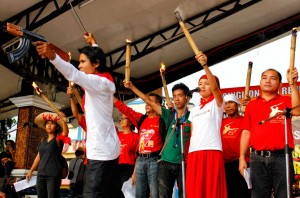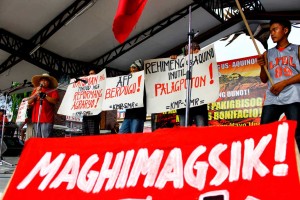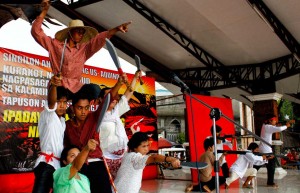- Activists and artists hold torches and arms in commemorating the 150th birthday of Katipunan leader Andres Bonifacio. (davaotoday.com photo by Medel V. Hernani)
- Activist workers tear a present-day “cedula” in protest of anti-labor policies during Bonifacio Day rally in Davao. (davaotoday.com photo by Medel V. Hernani)
- Like Bonifacio’s revolution, farmer activists also cry for land for the tiller. (davaotoday.com photo by Medel V. Hernani)
- Public school teachers join workers’ call for better pay and working conditions in Bonifacio Day rally. (davaotoday.com photo by Medel V. Hernani)
- Youth activist draws inspiration from Bonifacio’s legacy. to fight for nationalism and freedom (davaotoday.com photo by Medel V. Hernani)
- Cultural artists depicting the Katipunan in a Davao City rally. (davaotoday.com photo by Medel V. Hernani)
by DAVAO TODAY
On the 150th birthday of the Katipunan leader Andres Bonifacio, a bill was filed in Congress to declare him as national hero.
Bayan Muna Partylist Representatives Neri Colmenares and Carlos Isagani Zarate filed this bill in the House of Representatives Thursday, saying a need for a national symbol to “represent patriotism, nationalism and resolve to fight against any foreign intervention and control” can be found in Bonifacio’s legacy.
The bill raised again the debate between Bonifacio and Dr. Jose Rizal — the propagandist who inspired the revolution — as to who should be declared the national hero.
“It has long been a debate in schools and other venues of learning, and even among ordinary Filipinos, who between Rizal and Bonifacio must the title National Hero attach. A lot has also been said in favor or against both heroes. It is also a fact that both are heroes in their own respective right,” Bayan Muna’s resolution noted.
The bill noted there has been no law declaring a national hero for the country.
A National Heroes Committee was created in 1993 through Executive Order No. 75 to evaluate and recommend Filipino national heroes, but failed to come up with a choice.
“Some opinions say that deciding on a name might spur debates as to some historical controversies about the lives of our heroes,” the bill said.
Bonifacio Day on November 30 was declared a national holiday by the Philippine Legislature on February 16, 1921 through Act No. 2964 to commemorate the Katipunero’s birthday. While another legislation, Act No. 2760 in 1918 authorized the erection of a monument in memory of Bonifacio.
Rizal’s day of execution, December 30 was declared a day of national mourning by General Emilio Aguinaldo on December 20, 1898.
Bayan Muna said Rizal, through his two novels Noli Me Tangere and El Filibusterismo, was able to inspire the middle class to fight for reforms in society.
“It is true that Jose Rizal through his writings was able to put across the need for changes in the country that was dominated by Spanish colonial power. His writings influenced intellectuals who actively participated in the fight for reforms in society”.
But the bill noted that “Andres Bonifacio, on the other hand, was an intellectual impassioned by the need to change the oppressive and exploitative system not merely by writing about it but also by acting on it. Thus he organized the Katipunero’s KKK.”
Bayan Muna said the difference between Bonifacio and Rizal “lies in the ability of Bonifacio to translate Rizal’s writings into a language understandable to the Filipino masses and to transform and develop them into practice. Because of his actual participation in the KKK, Bonifacio was able to organize and mobilize thousands of Katipuneros in a revolution that ended the regime of Spanish Colonization and led towards a Filipino nation’s independence.”
“Bonifacio’s heroism inspires in us the patriotism and nationalism that is resolute and uncompromising which the people and especially the youth must learn and imbibe,” the partylist added.
Former Kabataan Parytlist Representative Raymond Palatino, in his online column in Bulatlat.com, also asserted Bonifacio’s legacy in the 1898 revolution is nothing to be glossed over.
Citing historical records, Palatino said historians recognized Bonfiacio as the country’s first president.
“Some historians believe that the Katipunan had become a de facto open government after August 1896. John Taylor, custodian of the Philippine Insurgent Records, described Bonifacio’s supreme council as the ‘insurgent government of the Philippines.’ An article in the 1897 issue of La Illustracion Espanola y Americana referred to Bonifacio as Presidente de la Republika Tagala,” Palatino wrote.
Palatino also added Bonifacio was recognized by another Asian independence hero for his feats at the same level as Rizal.
“It is not only Rizal who is considered the ‘pride of the Malay race’. Tan Malaka, one of Indonesia’s national heroes and founding leaders, recognized the heroism of both Rizal and Bonifacio,” he said.
“He specifically cited the revolutionary legacy of Bonifacio and his influence in sparking the anti-colonial movements across Southeast Asia. Professor Ramon Guillermo translated this quote from Tan Malaka: “Si Bonifacio ang pinakauna, hindi lamang sa Pilipinas, kundi sa buong Indonesia, oo, sa buong Asia na nanggaling sa, at edukado bilang, proletaryado, na nag-organisa ng mga proletaryo. (Bonifacio was the first, not only in the Philippines, but in also in Indonesia, yes and the whole of Asia, to come from and be educated as a proletariat [working class] and organized the proletariat),” Palatino noted.
Activists in Davao City held protest actions to commemorate Bonifacio’s 150th birthday and his legacy of nationalism. In the morning, the youth group AnakBayan staged a rally at the Bonifacio Rotunda along Magallanes Street
The Kilusang Mayo Uno honored the proletariat leader with a march from Magsaysay Park to Rizal Park in San Pedro Street. Workers tore a symbolic paper denouncing “anti-worker policies” such as labor-only contract and low wages.
The farmers group Kilusang Magbubukid ng Pilipinas also joined the rally. Their spokesperson Pedro Arnado said “just like Bonifacio, the KMP also fight for distribution of land to the tillers from the hacienderos and plantations.”
Members of Gabriela read poems while cultural activists staged a play and dance depicting the Katipunan’s history and the continuing struggles of the Filipinos against American rule. (davaotoday.com)
Andres Bonifacio, Bonifacio 150, jose rizal, November 30















